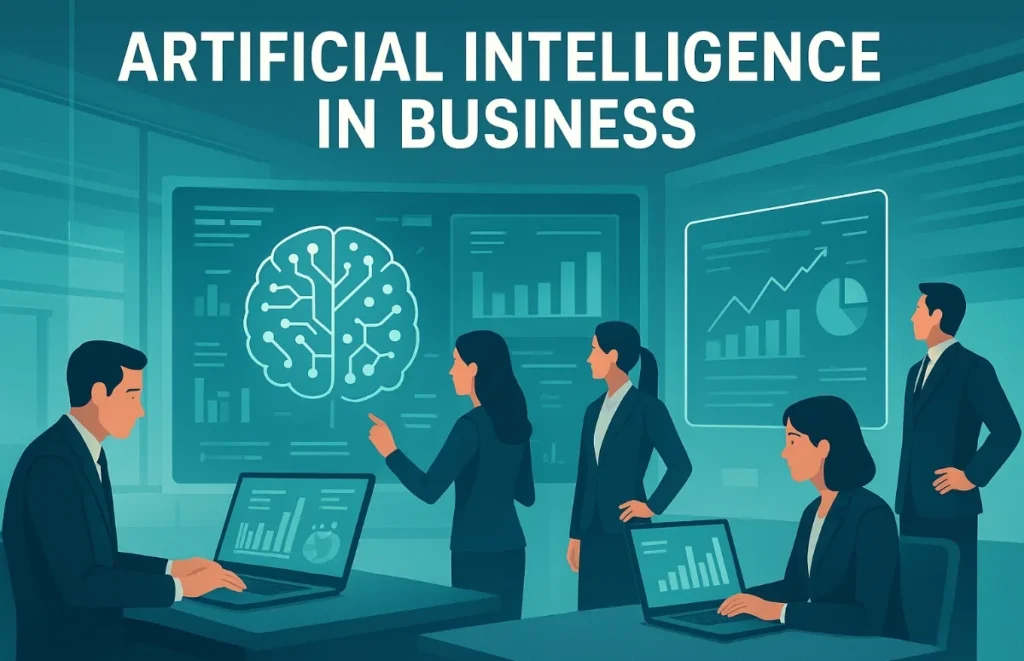Artificial Intelligence in Business Paragraph For Class 6, 7, 8, 9-10 & 11-12 Students

Artificial Intelligence in Business: Short & Smart Paragraphs for Students and Professionals
🔹 Introduction
Artificial Intelligence (AI) in business refers to the use of smart technologies like machine learning, automation, and data analytics to improve decision-making, productivity, and customer experience. Today, AI is helping companies streamline operations, predict trends, and enhance efficiency across industries.
🧠 A Paragraph on Artificial Intelligence in Business (150 Words)
Artificial Intelligence in business means using computer-based systems to make smarter and faster decisions. Many companies now depend on AI to analyze data, understand customer behavior, and automate daily tasks. For example, e-commerce businesses use AI to suggest products, while banks detect fraud through machine learning. By using AI tools, organizations save time, reduce errors, and increase profit. It also helps in better marketing and customer service. In short, AI is transforming traditional business models into digital powerhouses that rely on innovation and efficiency.
Summary:
AI empowers businesses with automation, analytics, and improved customer satisfaction.
🏢 A Paragraph on Artificial Intelligence in Business (200 Words)
Artificial Intelligence (AI) has become a powerful tool for modern businesses. It enables organizations to automate operations, predict market trends, and enhance decision-making. With the help of AI-driven tools, companies can analyze huge amounts of data within seconds and gain valuable insights. For instance, chatbots provide 24/7 customer support, while AI-powered marketing tools personalize ads for each customer. Moreover, industries like healthcare, finance, and retail are using AI to enhance accuracy and performance. Businesses are now saving time, reducing human errors, and achieving better productivity.
However, the use of AI also raises concerns about job replacement and data privacy. Despite these challenges, the advantages far outweigh the risks. Overall, AI in business is shaping the future of work with smarter, faster, and more efficient solutions.
Summary:
AI revolutionizes business with automation, data insight, and improved efficiency.
💼 Paragraph on 300 Words
Artificial Intelligence (AI) is one of the most transformative technologies in today’s business world. It combines data science, machine learning, and automation to help companies operate more intelligently. Businesses use AI for various purposes — from analyzing customer behavior to optimizing logistics and predicting sales trends. For example, Amazon uses AI algorithms to suggest products based on customer interests, while banks use AI models to detect fraud.
In marketing, AI personalizes advertising campaigns and improves customer engagement. In manufacturing, robots and AI systems manage production lines efficiently. Even in HR departments, AI tools help screen resumes faster and identify the best candidates. These innovations help organizations save time, reduce costs, and increase accuracy in decision-making.
Despite concerns about data privacy and workforce impact, AI continues to grow rapidly. Experts believe that within the next decade, most business operations will rely on AI-powered systems. Embracing AI not only ensures competitiveness but also prepares businesses for a smarter digital future.
Summary:
AI drives digital transformation, boosts performance, and secures future business growth.
🌍 Paragraph on 400 Words
Artificial Intelligence (AI) has revolutionized how businesses operate in the modern digital economy. It utilizes intelligent algorithms, big data, and automation to enhance every aspect of the business — from production and marketing to finance and customer service. With AI, companies can process massive datasets to predict trends, improve efficiency, and make informed decisions.
In marketing, AI tools analyze consumer behavior and personalize campaigns to target specific audiences. In finance, AI helps detect fraudulent transactions and manage risk more effectively. Retail businesses use AI chatbots for instant customer interaction, while manufacturers use predictive maintenance systems to avoid costly breakdowns. These AI-driven innovations improve accuracy, reduce manual workload, and increase profitability.
Moreover, AI supports strategic decision-making by offering real-time analytics and insights that humans might overlook. It also enhances customer satisfaction through automation and personalization. However, challenges like ethical use, data security, and job automation must be addressed responsibly.
In conclusion, Artificial Intelligence in business is not just a trend but a fundamental driver of innovation and competitiveness. As technology evolves, AI will continue to shape the future of industries by making them smarter, faster, and more adaptive.
Summary:
AI empowers industries through intelligence, automation, and innovation for a sustainable business future. IBM Artificial Intelligence Solutions.
Read Top 10 AI Productivity Tools in 2025
FAQ
Artificial Intelligence in business refers to the use of AI tools and algorithms to automate processes, analyze data, and improve performance.
AI enhances decision-making, saves time, and personalizes customer experiences — resulting in increased efficiency and profitability.
Key benefits include automation, cost reduction, better data analysis, and improved customer satisfaction.
AI is widely used in healthcare, finance, retail, logistics, and marketing industries.
Major challenges include high implementation costs, data privacy risks, and job automation concerns.
AI analyzes consumer data to create personalized campaigns and predict customer preferences.